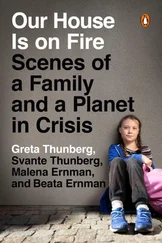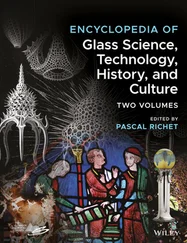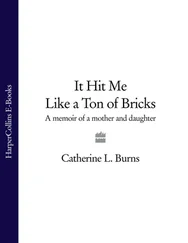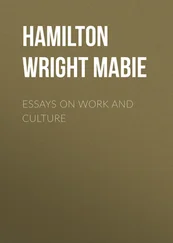I’d like to tell you how my grandparents thrived in their new environment, how they raised a successful family, and how they retired comfortably middle-class. But that is a partial truth. The full truth is that my grandparents struggled in their new life, and they continued to do so for decades.
For starters, a remarkable stigma attached to people who left the hills of Kentucky for a better life. Hillbillies have a phrase—“too big for your britches”—to describe those who think they’re better than the stock they came from. For a long time after my grandparents came to Ohio, they heard exactly that phrase from people back home. The sense that they had abandoned their families was acute, and it was expected that, whatever their responsibilities, they would return home regularly. This pattern was common among Appalachian migrants: More than nine in ten would make visits “home” during the course of their lives, and more than one in ten visited about once a month. [9] Carl E. Feather, Mountain People in a Flat Land: A Popular History of Appalachian Migration to Northeast Ohio, 1940–1965 (Athens: Ohio University Press, 1998), 4.
My grandparents returned to Jackson often, sometimes on consecutive weekends, despite the fact that the trip in the 1950s required about twenty hours of driving. Economic mobility came with a lot of pressures, and it came with a lot of new responsibilities.
That stigma came from both directions: Many of their new neighbors viewed them suspiciously. To the established middle class of white Ohioans, these hillbillies simply didn’t belong. They had too many children, and they welcomed their extended families into their homes for too long. On several occasions, Mamaw’s brothers and sisters lived with her and Papaw for months as they tried to find good work outside of the hills. In other words, many parts of their culture and customs met with roaring disapproval from native Middletonians. As one book, Appalachian Odyssey , notes about the influx of hill people to Detroit: “It was not simply that the Appalachian migrants, as rural strangers ‘out of place’ in the city, were upsetting to Midwestern, urban whites. Rather, these migrants disrupted a broad set of assumptions held by northern whites about how white people appeared, spoke, and behaved … the disturbing aspect of hillbillies was their racialness. Ostensibly, they were of the same racial order (whites) as those who dominated economic, political, and social power in local and national arenas. But hillbillies shared many regional characteristics with the southern blacks arriving in Detroit.” [10] Obermiller, Appalachian Odyssey , 145.
One of Papaw’s good friends—a hillbilly from Kentucky whom he met in Ohio—became the mail carrier in their neighborhood. Not long after he moved, the mail carrier got embroiled in a battle with the Middletown government over the flock of chickens that he kept in his yard. He treated them just as Mamaw had treated her chickens back in the holler: Every morning he collected all the eggs, and when his chicken population grew too large, he’d take a few of the old ones, wring their necks, and carve them up for meat right in his backyard. You can just imagine a well-bred housewife watching out the window in horror as her Kentucky-born neighbor slaughtered squawking chickens just a few feet away. My sister and I still call the old mail carrier “the chicken man,” and years later even a mention of how the city government ganged up on the chicken man could inspire Mamaw’s trademark vitriol: “Fucking zoning laws. They can kiss my ruby-red asshole.”
The move to Middletown created other problems, as well. In the mountain homes of Jackson, privacy was more theory than practice. Family, friends, and neighbors would barge into your home without much warning. Mothers would tell their daughters how to raise their children. Fathers would tell sons how to do their jobs. Brothers would tell brothers-in-law how to treat their wives. Family life was something people learned on the fly with a lot of help from their neighbors. In Middletown, a man’s home was his castle.
However, that castle was empty for Mamaw and Papaw. They brought an ancient family structure from the hills and tried to make it work in a world of privacy and nuclear families. They were newlyweds, but they didn’t have anyone to teach them about marriage. They were parents, but there were no grandparents, aunts, uncles, or cousins to help them with the workload. The only nearby close relative was Papaw’s mother, Goldie. She was mostly a stranger to her own son, and Mamaw couldn’t have held her in lower esteem for abandoning him.
After a few years, Mamaw and Papaw began to adapt. Mamaw became close friends with the “neighbor lady” (that was her word for the neighbors she liked) who lived in a nearby apartment; Papaw worked on cars in his spare time, and his coworkers slowly turned from colleagues to friends. In 1951 they welcomed a baby boy—my uncle Jimmy—and showered him with their new material comforts. Jimmy, Mamaw would tell me later, could sit up at two weeks, walk at four months, speak in complete sentences just after his first birthday, and read classic novels by age three (“A slight exaggeration,” my uncle later admitted). They visited Mamaw’s brothers in Indianapolis and picnicked with their new friends. It was, Uncle Jimmy told me, “a typical middle-class life.” Kind of boring, by some standards, but happy in a way you appreciate only when you understand the consequences of not being boring.
Which is not to say that things always proceeded smoothly. Once, they traveled to the mall to buy Christmas presents with the holiday throng and let Jimmy roam so he could locate a toy he coveted. “They were advertising it on television,” he told me recently. “It was a plastic console that looked like the dash of a jet fighter plane. You could shine a light or shoot darts. The whole idea was to pretend that you were a fighter pilot.”
Jimmy wandered into a pharmacy that happened to sell the toy, so he picked it up and began to play with it. “The store clerk wasn’t happy. He told me to put the toy down and get out.” Chastised, young Jimmy stood outside in the cold until Mamaw and Papaw strolled by and asked if he’d like to go inside the pharmacy.
“I can’t,” Jimmy told his father.
“Why?”
“I just can’t.”
“Tell me why right now.”
He pointed at the store clerk. “That man got mad at me and told me to leave. I’m not allowed to go back inside.”
Mamaw and Papaw stormed in, demanding an explanation for the clerk’s rudeness. The clerk explained that Jimmy had been playing with an expensive toy. “This toy?” Papaw asked, picking up the toy. When the clerk nodded, Papaw smashed it on the ground. Utter chaos ensued. As Uncle Jimmy explained, “They went nuts. Dad threw another of the toys across the store and moved toward the clerk in a very menacing way; Mom started grabbing random shit off the shelves and throwing it all over the place. She’s screaming, ‘Kick his fucking ass! Kick his fucking ass!’ And then Dad leans in to this clerk and says very clearly, ‘If you say another word to my son, I will break your fucking neck.’ This poor guy was completely terrified, and I just wanted to get the hell out of there.” The man apologized, and the Vances continued with their Christmas shopping as if nothing had happened.
So, yes, even in their best times, Mamaw and Papaw struggled to adapt. Middletown was a different world. Papaw was supposed to go to work and complain politely to management about rude pharmacy employees. Mamaw was expected to cook dinner, do laundry, and take care of the children. But sewing circles, picnics, and door-to-door vacuum salesmen were not suited to a woman who had almost killed a man at the tender age of twelve. Mamaw had little help when the children were young and required constant supervision, and she had nothing else to do with her time. Decades later she would remember how isolated she felt in the slow suburban crawl of midcentury Middletown. Of that era, she said with characteristic bluntness: “Women were just shit on all the time.”
Читать дальше
Конец ознакомительного отрывка
Купить книгу
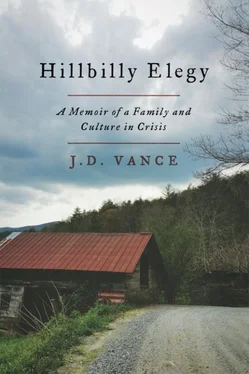
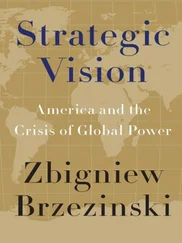

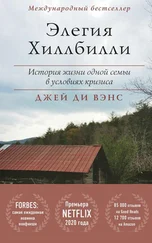
![Джей Вэнс - Элегия Хиллбилли [litres]](/books/399146/dzhej-vens-elegiya-hillbilli-litres-thumb.webp)
